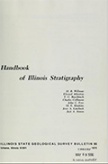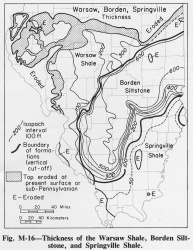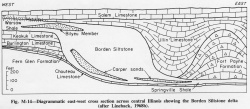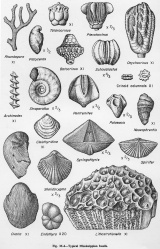Historical:Warsaw Shale
Lithostratigraphy: Mammoth Cave Limestone Megagroup >>Warsaw Shale
Chronostratigraphy: Paleozoic Erathem >>Mississippian Subsystem >>Valmeyeran Series
Allostratigraphy: Kaskaskia Sequence
Authors
Elwood Atherton, Charles Collinson, and Jerry A. Lineback
Name Origin
The Warsaw Shale (Hall, 1857, p. 54-56) is named for Warsaw, Hancock County.
Type Section
The type section of the Warsaw Shale is located near Warsaw, Hancock County, in the exposure in Geode Glen at Warsaw (NW NW 10, 4N-9W) (Collinson, 1964).
Extent and Thickness
The Warsaw is widely present in the bluffs of the Mississippi and Illinois Valleys in western and southwestern Illinois. It consists of as much as 300 feet of siltstone in west-central Illinois (fig. M-16), but it thins to less than 100 feet in the outcrop area, where it consists of gray shale containing beds of argillaceous limestone.
Stratigraphic Position
The Warsaw is overlain by the Sonora Formation or by the Ullin, Salem, or St. Louis Limestones. The Warsaw Shale overlies the Keokuk Limestone, and where the Keokuk and Burlington Limestones pinch out eastward the Warsaw is separated from the Borden Siltstone by a vertical cut-off (Lineback, 1966) (fig. M-14).
Description
The Warsaw consists of gray shale containing beds of argillaceous limestone. Quartz geodes are common and locally abundant; some are replacements of fossils. Some contain petroleum. Coarse silt and fine sandstone differentiated as the Bilyeu Member of the Borden Siltstone in central Illinois continues westward into the Warsaw Shale, where it becomes a member of the Warsaw.
Fossils
The Warsaw is fossiliferous, with brachiopods, bryozoans, and crinoids especially common. The corkscrew bryozoan, Archimedes (fig. M-4), is so abundant that the formation was called the Archimedes limestone in early reports.
References
COLLINSON, CHARLES, 1964, Western Illinois: 28th Annual Tri-State Field Conference, Quincy, Illinois, Illinois tate Geological Survey Guidebook Series 6, 30 p.
HALL, JAMES, 1857, Observations upon the Carboniferous limestones of the Mississippi Valley (abstract): American Journal of Science, v. 23, p. 187-203.
LINEBACK, J. A., 1966, Deep-water sediments adjacent to the Borden Siltstone (Mississippian) delta in southern Illinois: Illinois State Geological Survey Circular 401, 48 p.
ISGS Codes
| Stratigraphic Code | Geo Unit Designation |
|---|---|



